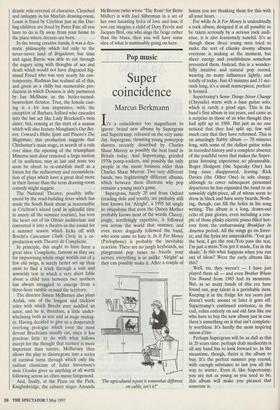Pop music
Super coincidence
Marcus Berkmann
It's a coincidence too magnificent to ignore: brand new albums by Supergrass and Supertramp, released on the very same day. Supergrass, thrusting young powerpop shavers recently described by Charles Shaar Murray as possibly the best band in Britain today. And Supertramp, grizzled 1970s pomp-rockers, and possibly the only people in the music business older than Charles Shaar Murray. Two very different bands, two frighteningly different albums, which between them illustrate why pop remains a young man's game.
Supergrass, barely 20 and from Oxford (reading dole and youth), are probably still best known for 'Alright', a 1995 hit single so ubiquitous that even the Queen Mother probably knows most of the words. Cheery, jangly, terrifyingly repetitive, it followed you across the world that summer, and even more doggedly followed the band, who soon came to hate it. In It For Money (Parlophone) is probably the inevitable reaction. There are no jangly keyboards, no playground pop tunes to frazzle your nerves; everything is as unlike 'Alright' as they can possibly make it. After a couple of `The agricultural report is somewhat different on cable, isn't it?' listens you are thanking them for this with all your heart.
For while In It For Money is undoubtedly a rock album, designed if at all possible to be taken seriously by a serious rock audi- ence, it is also fearsomely tuneful. It's as though these three young men tried to make the sort of chunky doomy albums everyone is making at the moment, but sheer energy and youthfulness somehow prevented them. Instead, this is a wonder- fully intuitive and natural pop record, wearing its many influences lightly, and totally of today. Just 43 minutes and 11 sec- onds long, it's a small masterpiece, perfect- ly formed.
Supertramp's Some Things Never Change (Chrysalis) starts with a bass guitar solo, which is rarely a good sign. This is the band's first album in ten years, and came as a surprise to those of us who thought they had split up in 1988. But just as no one noticed that they had split up, few will much care that they have reformed. This is an amazingly flabby album — 70 minutes long, with some of the dullest guitar solos in recorded history and a complete absence of the youthful verve that makes the Super- grass listening experience so pleasurable. Roger Hodgson (the Squeaky One) has long since disappeared, leaving Rick Davies (the Other One) in sole charge, although to cover subsequent personnel departures he has expanded the band to an unwieldy eight-piece, all of whom seem to dress in black and have sorry beards. Noth- ing, though, can fill the holes in his song writing. The album is a long, drawn-out echo of past glories, even including a cou- ple of those plinky electric piano-filled hor- rors from the embarrassing Breakfast In America period. All the songs go on forev- er, and the lyrics are unspeakable. `You get the best, I get the rest./You pass the test, I'm just a mess./You got it made, I'm in the shade.' Is this what happens when you run out of ideas? Were the early albums like this?
Well, no, they weren't — I have just played them all — and even Brother Where You Bound from 1985 had its moments. But, as so many bands of this era have found out, pop talent is a perishable item. Keeping it in the fridge for ten years just doesn't work; sooner or later it goes off. Supertramp's continued existence, in the end, relies entirely on sad old fans like me who have to buy the new album just in case there's something on it that isn't complete- ly worthless. It's hardly the most inspiring raison d'être.
Perhaps Supergrass will be as dull as this in 20 years time: perhaps drab mediocrity is all any band has to look forward to. In the meantime, though, theirs is the album to buy. It's the perfect summer pop record, with enough substance to last you all the way to winter. Even if, like Supertramp, you are not as young as you used to be, this album will make you pleased that someone is.


































































 Previous page
Previous page